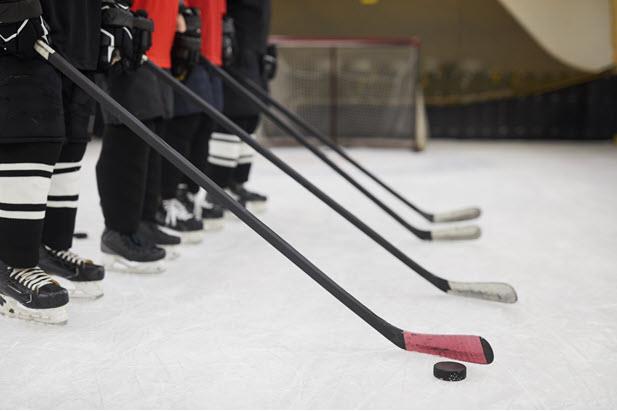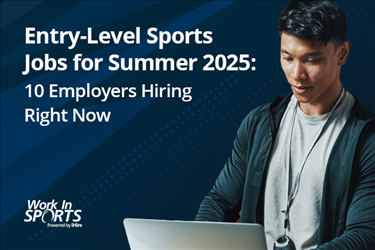- Job Seeker Resources
- |
- Last Updated: June 26, 2025

How to Get a Job in the NHL: Tips and Advice
Working in the NHL might seem like a dream reserved for athletes. But the players are only the tip of the iceberg – from marketing to media to operations, there are dozens of ways to get front and center in the action. Whether you’re aiming for NHL front office jobs or looking to break in through an entry-level arena operations role, understanding the landscape of NHL job opportunities will help you move with purpose.
How to Get a Job in the NHL
Start by thinking about where you fit and what skills you need to get there. Then, start building experience and creating a sport-specific resume. Let’s break down the steps on the path to the NHL job of your dreams.
1. Understand the Types of Jobs Available in the NHL
NHL jobs span a wide range of departments and skillsets. You don’t need to lace up your skates to make an impact.
Here are some areas you can step into:
- Business operations: sales, sponsorships, marketing, finance, and human resources
- Team operations: scouting, video analysis, player development, coaching support
- Game-day and event roles: video production, ticketing, guest services
- Media and communications: content creation, PR, social media
- Arena and facility operations: security, maintenance, engineering
Whether you’re aiming for an NHL front office job or a role supporting a team from behind the scenes, there are many positions that could align with your strengths.
2. Develop In-Demand Skills for NHL Careers
While passion for hockey helps, it’s your skills that make your application stand out. NHL teams hire across many departments that value different strengths.
Strong Communication and Collaboration
You’ll often work across departments or with external partners. Clear written and verbal communication is essential, especially in fast-paced, sports environments.
Experience with Digital Tools and Data
Regardless of the department, NHL front office jobs require using tools like CRM systems driven by analytics platforms with data dashboards. Knowing how to track performance, measure the engagement from your work, and use that information to improve customer relationships is how you add real value.
Background in Business and Event Operations
Many NHL team jobs require experience planning events and the campaigns that drive them, or simply managing things like budgets. Roles in sponsorship, fan engagement, and ticket sales often look for people who can think strategically and act quickly.
Scouting Experience or Coaching Credentials
If you’re aiming to work with players or staff, you’ll need relevant experience. This might include creating scouting reports or attaining coaching certifications. A background in athletic performance and training is also beneficial for these disciplines.
Even if you’re not coming from a sports background, your skills may still transfer. A strong salesperson can succeed in ticketing. A digital marketer can help boost fan engagement. Focus on what you bring, and take time to learn how it connects to the sports world. NHL teams look for impact, and that’s something you can show no matter where you’ve worked before.

3. Start with Experience in Amateur, Minor League, or College Hockey
Most people don’t walk straight into NHL team jobs. Starting with a smaller organization builds credibility and gives you practical experience. Plus, the connections you make there can help you later down the line.
Working with AHL or ECHL teams, or supporting college hockey programs, can open the door. These roles offer hands-on opportunities in tight-knit environments and show NHL hiring teams that you’re serious about building a career in sports.
Need inspiration? Take a look at how Mike Snee made an impact in amateur sports by starting at the grassroots level.
4. Network Like a Pro
Knowing the right people still matters in sports, but you don’t need to be loud or outgoing to build strong connections. A thoughtful, consistent approach works just as well.
Here’s where to start:
- Attend career events hosted by NHL teams, leagues, and other sports organizations. These are great chances to meet insiders and ask questions face-to-face.
- Engage with NHL employees on LinkedIn. Follow their posts, leave a comment, or send a short, respectful message to start a conversation.
- Reach out to alumni from your school or past internships. A shared connection makes it easier to break the ice.
- Request short informational interviews. Ask for 10–15 minutes to hear about an industry professional’s career path and what they’ve learned.
When you reach out to people in your network, be clear and specific and show that you’ve done your research. Ask focused questions that create a sense of intentionality. Follow up with a well-thought-out thank you. That kind of professionalism stands out, and people remember it.
Find NHL Jobs
Create Your Free WorkInSports Account to Start Your Search

Job Seeker Sign In
We Value Your Privacy
5. Create a Standout Sports-Specific Resume
Your resume should show that you understand what NHL jobs require. And, if your experience isn’t directly in sports, your resume should demonstrate an understanding of how your skills translate. Tailor it so hiring managers see how your skills fit their needs.
Here’s how to build a strong resume:
- Highlight teamwork: NHL front office jobs rely on collaboration. Show how you’ve worked with others to reach goals or led team projects.
- Use measurable results: Add numbers to your achievements when possible, like “Increased ticket sales by 20%” or “Managed events with 5,000+ attendees.”
- List relevant skills: Include project management, event coordination, CRM software experience, data analysis, or marketing tools that match the job description.
- Show problem-solving: Explain how you’ve handled challenges or improved processes under pressure.
- Tailor your resume: Match your experience and language to each job posting. Avoid one-size-fits-all resumes.
- Keep it clear and concise: Use bullet points and action verbs. Aim for a one-page resume that’s easy for a hiring manager to scan.
6. Stay Persistent and Informed
Getting a job in the NHL isn’t easy. Competition is high, but staying in the loop gives you an edge.
Here are some tips on how to stay ahead:
- Sign up for job alerts on team websites and platforms like WorkInSports.
- Follow hiring announcements and industry news.
- Be ready to apply when the right job posting arises.
Take a look at how Everett Fitzhugh landed his dream job with the Seattle Kraken. His journey proves that preparation and passion can open doors – even in a competitive league.
Final Thoughts on How to Get a Job in the NHL
Knowing how to get a job in the NHL means understanding the roles available, building the right skills, and showing up with a strong, targeted application. Whether you’re just starting out or you’re looking to level up, NHL job opportunities are within reach if you’re willing to put in the work.
If you’re ready to pursue NHL team jobs or explore your next step in the sports industry, WorkInSports is here to support you every step of the way.
Sign In or Register to access all articles and insider tips for help in your job search.
Search for Sports Jobs
RELATED JOBS
UPPER ARLINGTON CITY SCHOOLS Upper Arlington City School District Position: Middle School Girls...
Soccer Instructor - Whitehall YMCA1. Thinks, communicates and behaves as a cause-driven leader and role model for other staff and...
Food & Beverage DirectorColumbus Country Club is excited to announce the opening for a Director of Food and Beverage!...
Registered Dietitian (RD) - Per DiemOverview OhioHealth Rehabilitation Hospital Joint venture/Partnership/Affiliation with Select...
Registered Dietitian (RD) - Per DiemOverview OhioHealth Rehabilitation Hospital Joint venture/Partnership/Affiliation with Select...
RELATED RESOURCES
Find the Right Job Faster
- Get personalized job matches sent to your inbox every day
- Connect directly with employers before your competition
- Advance your career with expert advice on interviewing, salary negotiation, and more
We value your privacy




